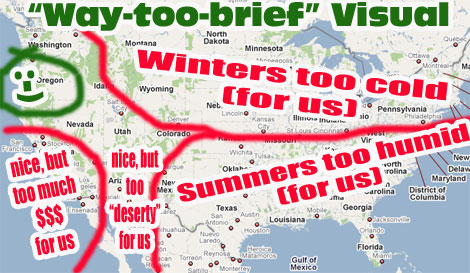
You know about raw foods, I know about raw foods, and we both know people who know about raw foods. It seems like more and more people know about this lifestyle than ever before -- and that's absolutely true! But, it's still true that, on the whole, the average person on the street knows almost nothing about it. As such, if you're a raw foodist, you often find yourself in situations in which you're explaining it to people. (Obviously, as raw foods bloggers, we're more than happy to do so, of course!)
Amid all of these explanations to new friends and new readers, it's not too uncommon to hear people scoff at the idea in one way or another. Common objections include things like:
Did you know that approximately 70% of your muscle, 80% of your blood is water, and 85% of your brain is made up of water? When we are born, we are nearly 90% water by weight, and as we age we lose more and more water (think of a grape slowly shriveling up into a dried raisin).
If you consume 100% fresh raw foods (with none that have been dried or dehydrated in any way), your body is receiving the cleanest, most pure water possible and you probably don't experience a lot of thirst. The less fresh foods an individual consumes, the more their needs for water increases.

I'm pretty sure I've said this before, but I'm thankful for so many things that it could take me a very long time to list them all. Today, however, I'm focusing on how thankful I am to have loving, supportive friends in my life.
When I was a child we moved a lot (every two years, on average). I continued to move a lot even after college, when it was no longer my mother making the decisions about moving.Why am I telling you this on a Thankful Thursday ?Because all of that moving around when I was a young child partly shaped the way I made friends.

Jim here... Of the many lessons 2008 brought to our household, one standout was certainly the importance of having patience. That s because we set some lofty goals, and lofty goals are often vital teachers.
For example, imagine sitting in your living room one day and deciding: "I'm going to scale Mt. Everest."? (For the purposes of this example, imagine also that no political, administrative, or financial restrictions exist to prevent you from doing this immediately if you really wanted to -- things like passports, entry visas, transportation costs, etc.)
Read more: Acknowledging Changes and Growth: 2008 / 2009, Part 2
Today we thought we'd introduce you to a common wild edible known as Purple Deadnettle (or, more dramatically, the Purple Archangel). Watch the video and let us know if it grows in your area, and if you've tasted it!

As promised yesterday, here s the Pure Jeevan cross-country tour itinerary! Will Wendi and KDcat be in your town or city? If so, please be sure to let us know, so they can meet you in person! We re all very excited that Pure Jeevan will be meeting some of you in person very soon!
We'll be posting a button on the right side of the blog later this week. When you click on the button, it'll take you to an up-to-date itinerary of all cities on the tour, as well as any talks/gatherings, etc. that may be going on. On that page, you may also be able to view some live video streaming of Wendi and KDcat as they're out and about finding the perfect location for Pure Jeevan. Stay tuned for more info!
Over the next few months and the coming year, you'll be witnessing the continued growth of Wendi Dee and Pure Jeevan in ways you might not ever have imagined! So, stay connected and let us know your thoughts about the changes that are (and will be!) taking place. We're not here for ourselves, we're here for all of you and for those who don't know about us (yet!). We have a mission: to share our stories and inspire others to fully embrace their lives and be all that they could ever desire (including healthy, happy, and vibrant)!
This is a long post, even though I tried to keep it brief. It's mostly a personal entry, but I wanted to share things so that you know a bit about what's going on with me and Pure Jeevan, now and in the near future. I'll break it up a bit with some more photos from Raw Spirit, the most therapeutic and life-changing event of my life.
======Wendi Dee's Growth======

Sorry for the strange behavior of this site over the past few weeks, friends. As a former professional web programmer, and always a?bit of a mad hacker, I'm usually really great at keeping the web end of Pure Jeevan running very smoothly.
But, this is a Wordpress blog -- and so you have things like plugins and widgets and themes and updates, all interacting (and sometimes conflicting) with one another. I've noticed lately that this blog home page has developed all sorts of peculiar issues, not the least of which is a very slow-loading tendency.
Read more: Hopefully Pure Jeevan Loads a *Little* Faster Today!

Well, I hope we're finally approaching the true end-game of our whole move. We now have our home listed with a new realtor (no longer going it alone as a "for sale by owner" scenario), so we're hoping that a renewed effort (and a lower price) will attract a buyer. The market seems to be perking back up a little as well, which certainly can't hurt anything.
Thanks to everyone who sent in suggestions for places we should consider moving to. I assure you that we researched each and every one to an almost ridiculous degree. There are more amazing places to live than we ever knew, and we were delighted to learn about some areas with which we weren't very familiar -- funky little enclaves in Texas, Tennessee, New Mexico, etc. I think we've hinted as to our inclinations before, but I can tell you that, after so many months of intense deliberation, we believe the best domestic home for Pure Jeevan is probably in Oregon.

Finally, some super news to share!? On Monday, after a l-o-n-g wait, Wendi finally had her appointment with a actual LLMD. (That stands for "Lyme Literate Medical Doctor."? If this and the news of Wendi's Lyme Disease is new to you, check out this post.)
I'll cut straight to the good part: Her prognosis is excellent! Yes, she's still in a world of pain and misery at the moment, but he believes (based on her blood work and her symptoms) that we've caught this early enought to fully eradicate the Lyme. (At least, that's how I understand it. I'm actually not clear on whether Lyme is ever 100% eradicated, or if it's just forced into dormancy or irrelevancy. Perhaps Wendi can clear that point up later.)

Jim here with another exciting edition of Weird Wednesday. You know, each time I say "weird," I don't always mean the same thing. Sometimes "weird" means odd or strange. Other times it means funny or ironic. It might also mean unusual or out-of-the-ordinary. Come to think of it, the definition of weird is also weird.
Today, I was thinking about an old friend, Jim Banholzer. He lived next door to Wendi and me when we first moved to the D.C. area in 1991. We all lived in a small "garden apartment" complex in Falls Church, Virginia. Our roommate at the time worked as a leasing agent there, which qualified us for a decent rental discount. I think we paid $800 or so for the place, an upscale 2-bedroom townhome close to the community pool. Jim lived next door with one of the more unstable people I've ever met (and, trust me, that's saying something).

